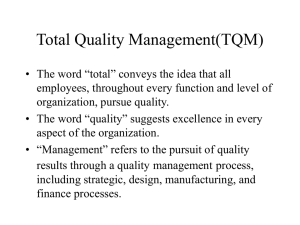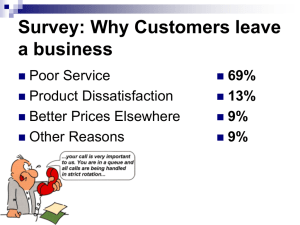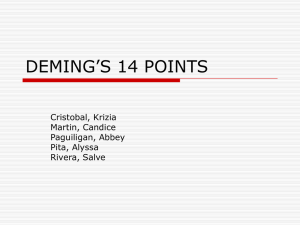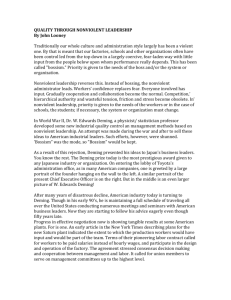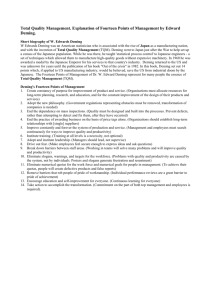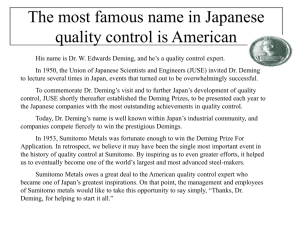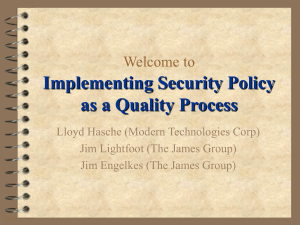Promotions and Firing Policy Team A2 Nikunj Emre
advertisement
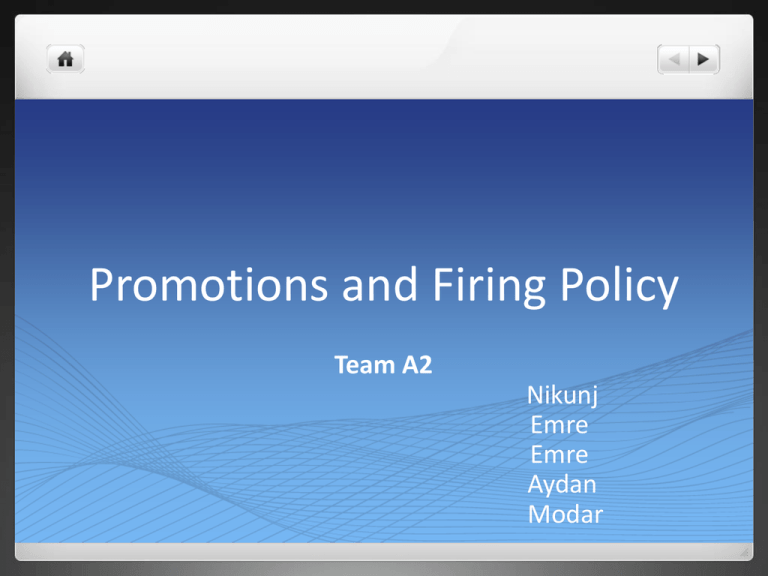
Promotions and Firing Policy Team A2 Nikunj Emre Emre Aydan Modar Agenda Who is Jack Welch? Jack Welch’s Statement Deming’s System of Profound Knowledge The relation between System of Profound Knowledge & Deming’s 14 principles Conclusion References Jack Welch Jack Welch was the Chairman and CEO of General Electric between 1981 and 2001 The company’s value rose 4000% during his career in GE and made GE one of the most valuable company in the world. Known as a Six Sigma Guru www.cbsnews.com (2005) Jack Welch In 2001 Jack Welch, then CEO of GE Corporation and Six Sigma Guru made the following statement: “A company that bets its future on its people must remove the lower 10%...and keep removing it every year “ His policy based on selecting the right people which is called “Forced Ranking System” (Union, 2011) Jack Welch’s Statement Annually out of 10 people; 2 persons should be promoted 7 persons should remain the way they are 1 person (ranked at the bottom) should be fired (Union, 2011) Forced Ranking System GE’s not alone. Ranking employees is everyday practice at highly admired companies like Microsoft, Cisco Systems, Hewlett Packard, and Sun Microsystems (Grote, 2002) Deming’s System of Profound Knowledge Appreciation for the system Theory of Knowledge SOPK Knowledge about variation Knowledge of Psychology (Deming, 1994) Appreciation for The System Appreciating a system is an understanding of the overall processes involving suppliers, producers, and customers (or recipients/consumers) of goods and services (Management Solutions, LLC, 2010) Feedback plays a significant role for appreciation Appreciation for The System Appreciation for The System & Deming’s Principles “Create constancy of purpose toward improvement of product and service” (Rule 1), (Deming, 1993) “Adopt the new philosophy” (Rule 2), (Deming, 1993) “Cease dependence on inspection to achieve quality” (Rule 3), (Deming, 1993) Appreciation for The System & Deming’s Principles “Break down barriers between departments” (Rule 9), (Deming, 1993) “Remove barriers that rob people in management” (Rule 12), (Deming, 1993) Knowledge of Psychology Deming believes that the most important motivation comes from inside the person Intrinsic motivation is the driving force for people to seek innovation and the improvement Deming indicates that focusing on extrinsic motivational method has a destructive affect on intrinsic motivation (Deming, 1994) Knowledge of Psychology & Deming’s Principles “Drive out fear” (Rule 8), (Deming, 1986) According to Deming’s rule 8; “ People are born with a need for relationships with other people, and need for love and esteem by others” (Deming, 1986) Management by fear as counter- productive in the long term, because it prevents workers from acting in the organization's best interests. (Hillmer, 1997) Theory of Knowledge Knowledge is not possible without theory (Deming, 1993) Theory helps organizations to understand the cause and effect relationship Without theory experience teaches nothing (Maguad, 2010) Practice is permanent with theory Knowledge of Variation UCL UCL 2 LCL UCL Special causes UCL LCL Promoted Employees LCL Common cause/Normal Conclusion According to Deming’s deadly diseases, evaluation of performance (annual review) in general has a bad effect on the employee’s moral and the organizational culture as a whole. However, this approach might not be right for all companies at a particular time, but sometimes it might be the right choice at the right time. Thank you… Questions? References http://www.cbsnews.com/stories/2005/03/24/60II/main682830.shtml Berry, B. (2011) The link between Deming’s Theory of Profound Knowledge and Systems Thinking Deming, W. E. (1986) Out of the crisis, Cambridge: Massachusetts Institute of Technology Deming, W. E. (1994) Out of the crisis, Cambridge: Massachusetts Institute of Technology References Grote, D. (2002), Forced Ranking: Behind the Scenes, Published in Across the Board Magazine, December Issue, pp: 2-16 Maguad, B. , A. (2010) Deming’s ‘Profound Knowledge’: Implications for Higher Education, Proceeding of ASBBS, 17, 1, pp: 664-668 Management Solution, LLC (2010), Deming’s System of Profound KnowledgeAppreciation of a System Unite the Union (2011) Forced Ranking in Performance Management Steven Hillmer, University of Kansas, Journal of quality management, vol:2 no:2, pp. 171-189, 1997
